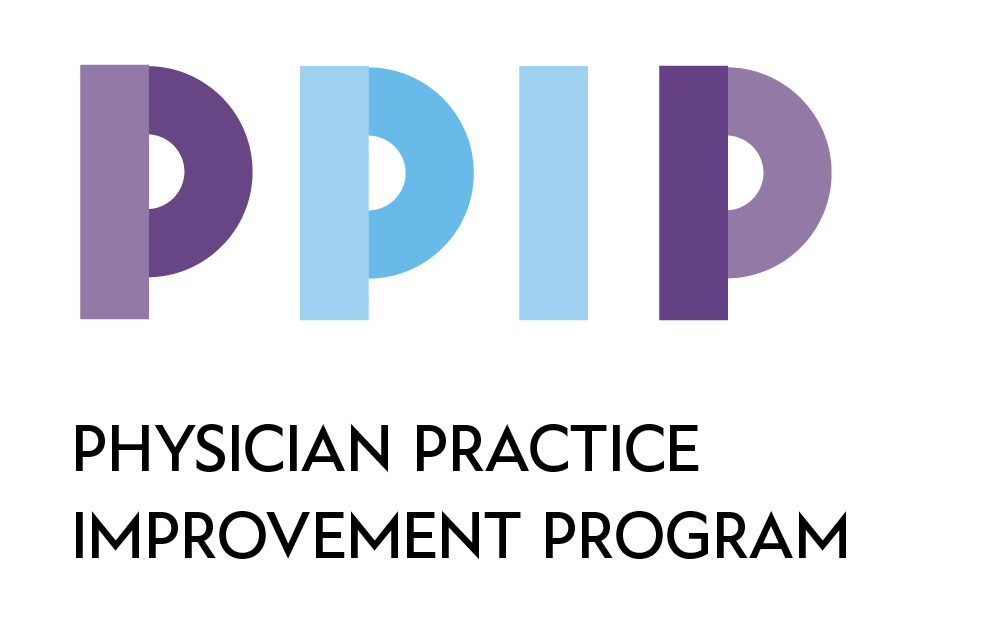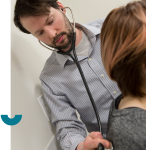Share
For One Clinic, Honest Communication And Teamwork Means Improved Patient Care
Go back to MessengerProviding quality care, embracing improvement and creating a positive experience for all her patients is a priority for Dr. Patricia Belda. Fortunately, this priority is not only shared, but embraced by her colleagues.
Dr. Belda has been part of the Family Medicine team at Edmonton’s Kaye Clinic since 2013, where she quickly realized her passion for quality care and practice improvement was the rule, not the exception. The clinic’s team all work together to facilitate open communication, and everyone is encouraged to think about how to enhance the care they all work so hard to provide.
This culture of practice improvement was pioneered by Dr. Nigel Flook. In addition to his role as a Senior Medical Advisor at CPSA, Dr. Flook is the clinic’s Chief of Family Medicine.
“When it comes to quality improvement in medicine, there is often a sense of ‘let’s just get it out of the way’ instead of making it part of the culture, something we’re always doing,” says Dr. Flook. “For us, it’s a priority and we’re doing it not because we have to, but because it’s the right thing to do.”
The team began having weekly meetings in 2012, where everyone would gather to discuss a number of topics: leadership, physician health, clinic operations, team building, medical education and of course, quality improvement.
“While quality improvement comes up in most of our discussions, it is the main focus of our meetings every four weeks,” shares Dr. Flook.
“Everyone at the clinic takes part in these meetings, physicians, care providers and support staff,” says Dr. Belda. “Getting together regularly means we’re not just meeting when there’s pressing issues to discuss. Sometimes there is structure to our conversations but often, it’s just open discussion. This allows everyone to share successes and discuss challenges so we can work towards solutions, examine outcomes and talk as a team about what we can all learn from those outcomes.”
Many of these discussions have been the beginnings of significant change at the clinic. After someone spoke of a near-miss with referral tracking, everyone began working together to develop a high-risk patient recall list.
“We looked at the problem as a team and broke it down into pieces,” says Dr. Belda. “We wanted to be able to add patients to a recall list, with a date for when follow-up would be needed (for example, a patient who needs a colonoscopy every five years). We reached out to Alberta Health Services and our Primary Care Network for support, and we worked with our EMR provider to create the list.”
This initiative is still being refined but, according to Dr. Belda, it’s already making a difference to the clinic’s team and their patients.
“Before, everyone was doing something different but now, the process is clear,” she shares. “We’ve added additional, streamlined steps to help us keep track of patients who need to come back for follow-up. This allows us to reach out to those patients and they’ve appreciated the reminders.”
Next steps include creating an online patient portal for the clinic, where patients can log in to manage their appointments and receive follow-up reminders. Says Dr. Belda, “This is just getting off the ground but ultimately, we want to empower patients, so they can be in control of what happens with their care.”
Before joining the Kaye Clinic, Dr. Belda participated in physician practice improvement but nothing standardized, which made it difficult to measure success. While she knows she still has a lot to learn, she’s looking forward to spearheading the team’s continued efforts in quality improvement as she prepares to step into the clinic’s Chief of Family Medicine role upon Dr. Flook’s retirement at the end of the year.
“New practitioners at our clinic have said they’ve never been part of this kind of improvement culture before. We want to provide the best care we can, in an environment that is positive and healthy,” shares Dr. Belda. “We’re about to start a standardized assessment of our clinic to identify more areas for improvement and ensure patient and provider satisfaction. We’re looking at how to gather feedback from multiple sources and hope to bring in a facilitator to lead conversations on how we can improve based that feedback.”
Dr. Belda recognizes not all physicians have needed resources readily available for quality improvement. In those situations, she encourages them to reach out for help.
“The reality is some clinics are without resources like a facilitator. This is where support from partners like our PCNs is so valuable, to help us bring structure to our initiatives.”
And it all began with a weekly meeting.
“We’ve created this feeling of ‘we’re all in this together’,” says Dr. Flook. “Quality improvement is not done to people. Taking the reins and doing our own is more effective. And working together means different perspectives, ideas and values are being heard. For us, this has led to an environment rich for improvement.”

Questions about practice improvement? Please use the contact form below:
Contact - PPIP
Related News
All News & EventsJanuary 20, 2021
MyHealth Records: Lab Results Online For Patients Via My Personal Records
December 15, 2020
From AHS – Important Information For Primary Care And Community Providers Related To The Impact Of Connect Care: Connect Care Identifiers
December 15, 2020
From The Prescription Pad: The Latest TPP Alberta News
December 15, 2020
























Comments for this post are now closed. If you would like to share your feedback on this topic, please email support@cpsa.ca.